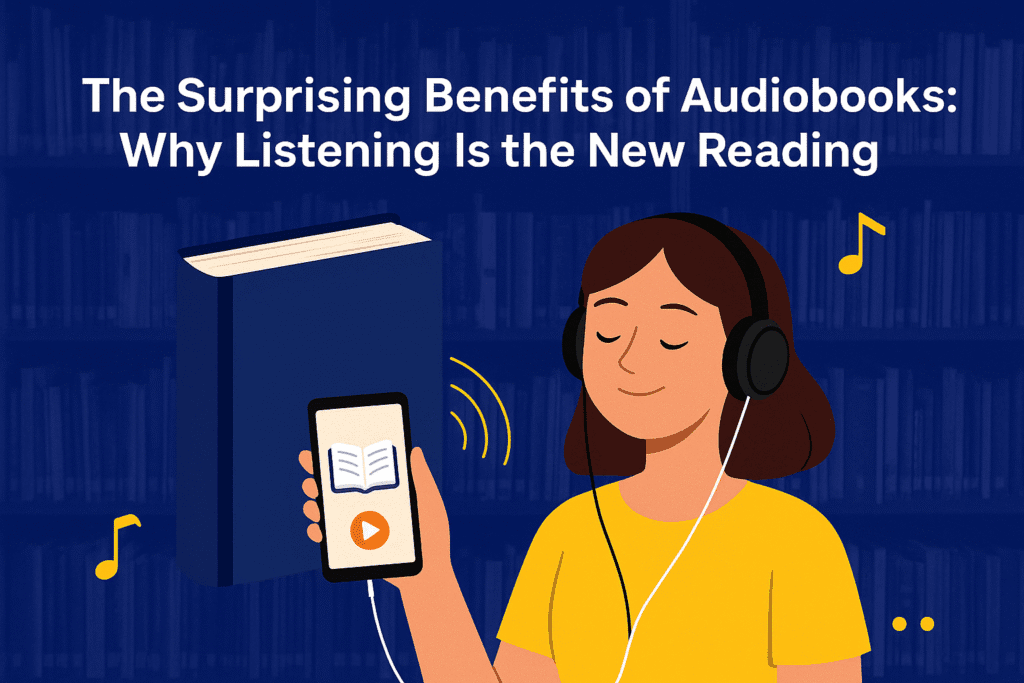In today’s fast-paced, multitasking world, people are constantly looking for smarter ways to consume content. Enter audiobooks—a format that’s exploded in popularity over the last decade, offering convenience, engagement, and accessibility that traditional print or even eBooks can’t always match. Whether you’re commuting, working out, or simply resting your eyes, audiobooks offer a powerful alternative to traditional reading. But they’re not just about convenience—they come with a host of benefits that can transform how you learn, enjoy, and experience stories.
Let’s dive deep into the key benefits of audiobooks, and why they might just become your new favorite way to “read.”
Multitasking Made Easy
One of the most obvious and celebrated benefits of audiobooks is hands-free and eyes-free learning. You can listen while driving, cooking, cleaning, jogging, or commuting—making it easy to fit more books into your day. For people with busy lifestyles, this is a game-changer. You no longer have to choose between reading a book and being productive elsewhere. Audiobooks allow you to combine learning with daily routines, giving you more value for your time.
Improves Comprehension and Retention
Many people worry that they might not retain information as well from audio. But studies suggest the opposite: listening to audiobooks can actually enhance comprehension, especially when paired with strong narration. Great narrators use tone, pacing, and emotion to bring stories to life—making it easier to understand character dynamics, story arcs, and even complex nonfiction concepts. This emotional delivery can stimulate mental visualization, making the content more memorable.
Ideal for Auditory Learners
We all have different learning styles. For auditory learners—people who learn best through listening—audiobooks are a perfect match. Instead of struggling through written text, auditory learners can absorb and retain information more efficiently through sound. This is especially useful for students, professionals, or anyone looking to retain large amounts of information quickly and effectively.
Reduces Eye Strain and Fatigue
In a digital world full of screens, eye strain is a real issue. Whether you’re working on a computer, scrolling through your phone, or reading on a tablet, your eyes are constantly under stress. Audiobooks provide a much-needed break for your eyes, helping reduce fatigue and dryness while still allowing you to consume meaningful content.
Accessible for the Visually Impaired and Dyslexic Readers
For those with visual impairments or reading disabilities like dyslexia, audiobooks can be a life-changing resource. They remove barriers to reading, giving more people the ability to enjoy literature, gain knowledge, and explore the world of storytelling. Thanks to platforms like Audible, Google Play, and Apple Books, audiobooks are now widely accessible, with many even offering playback speed control and bookmarking options for an even better experience.
Makes Better Use of “Dead Time”
Think about all the time you spend waiting—in lines, at airports, during traffic jams. Now imagine turning those moments into opportunities for learning or entertainment. Audiobooks turn idle time into productive time. Instead of scrolling aimlessly on your phone, you could be halfway through a new novel or deep into a motivational self-help book.
Expands Your Reading List
Because audiobooks are so easy to integrate into your daily routine, most listeners report that they consume more books per year after switching to audio. Whether it’s fiction, nonfiction, business, health, or philosophy, audiobooks help you cover more ground. Want to finally tackle that 500-page epic you’ve been avoiding? Listen to it in chunks while walking the dog or doing laundry—it won’t feel as intimidating.
Enhanced Storytelling Through Voice Performance
One of the underrated joys of audiobooks is the performance element. Skilled narrators breathe life into characters with distinct voices, dialects, emotions, and pacing. Some books are even narrated by celebrities or voice actors, turning the experience into something closer to a one-person stage play. This creates a cinematic experience in your mind—engaging, immersive, and deeply entertaining. It can also help listeners better understand the mood, emotion, and intent behind a scene.
Great for Family Bonding and Group Listening
Audiobooks aren’t just for solo consumption. Many families now enjoy audiobooks together on road trips, during family evenings, or while cooking meals. Whether it’s a children’s classic or a mystery thriller, audiobooks can create shared experiences and open up meaningful discussions. Some schools even recommend audiobooks as a way for parents and children to read together, especially for kids who might struggle with traditional reading.
Encourages a Return to Reading
Let’s face it—many people struggle to finish books these days. Life gets busy, attention spans are shorter, and books gather dust on shelves. But audiobooks are bringing people back to reading—just in a modern, convenient format. You might not sit and read a paperback for an hour, but you’ll listen to an audiobook while walking or folding laundry. It removes the pressure and brings back the joy of storytelling.
Final Thoughts: Is Listening Really Reading?
Some traditionalists argue that audiobooks aren’t “real reading.” But in truth, reading is about absorbing stories, ideas, and information—whether it’s through your eyes or your ears. In fact, audiobooks have helped millions of people rediscover the joy of literature, tackle more books than ever before, and learn on-the-go in ways that printed pages could never allow.
With accessibility, immersion, and efficiency on their side, audiobooks are not just a trend—they’re a new frontier for readers of all ages. So, if you haven’t yet embraced the world of audiobooks, now might be the perfect time to start. Whether you’re a lifelong reader, a student, a parent, or someone who simply wants to make better use of their time—audiobooks offer a powerful, enriching experience that can change how you engage with stories forever.


